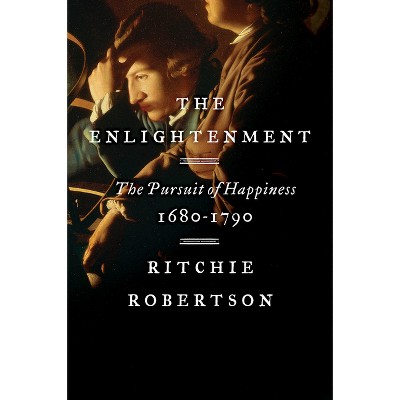Sponsored

Enlightenment Biopolitics - (Life of Ideas) by William Max Nelson
$35.00
In Stock
Eligible for registries and wish lists
Sponsored
About this item
Highlights
- A wide-ranging history tracing the birth of biopolitics in Enlightenment thought and its aftermath.
- Author(s): William Max Nelson
- 336 Pages
- History, Modern
- Series Name: Life of Ideas
Description
About the Book
"In Enlightenment Biopolitics, historian William Max Nelson pursues the ambitious task of tracing the context in which biopolitical thought emerged and circulated. He locates that context in the Enlightenment, when emancipatory ideals sat alongside the horrors of colonialism, slavery, and race-based discrimination. These did not just coexist, Nelson argues; they were actually mutually constitutive of Enlightenment ideals. Nelson focuses on Enlightenment-era visions of eugenics (including proposals to establish programs of selective breeding), forms of penal slavery, and spurious biological arguments about the supposed inferiority of particular groups. The Enlightenment, he shows, was marked by a proliferation of discourses on shaping, harnessing, and "organizing" the minds and especially the bodies of citizens. In his reading of the birth of biopolitics and its transformations over time, Nelson examines the often shocking conceptual and practical connections between inclusion and exclusion, equality and inequality, rights and race, the supposed "improvement of the human species" and practices of dehumanization"--Book Synopsis
A wide-ranging history tracing the birth of biopolitics in Enlightenment thought and its aftermath. In Enlightenment Biopolitics, historian William Max Nelson pursues the ambitious task of tracing the context in which biopolitical thought emerged and circulated. He locates that context in the Enlightenment when emancipatory ideals sat alongside the horrors of colonialism, slavery, and race-based discrimination. In fact, these did not just coexist, Nelson argues; they were actually mutually constitutive of Enlightenment ideals. In this book, Nelson focuses on Enlightenment-era visions of eugenics (including proposals to establish programs of selective breeding), forms of penal slavery, and spurious biological arguments about the supposed inferiority of particular groups. The Enlightenment, he shows, was rife with efforts to shape, harness, and "organize" the minds and especially the bodies of subjects and citizens. In his reading of the birth of biopolitics and its transformations, Nelson examines the shocking conceptual and practical connections between inclusion and exclusion, equality and inequality, rights and race, and the supposed "improvement of the human species" and practices of dehumanization.Review Quotes
"Enlightenment Biopolitics is an essential work that will be read with great interest by political and intellectual historians. Nelson's study offers a critical reassessment of Foucault's biopolitics by tracing its roots to 18th-century practices of racial, social, and reproductive control. By illuminating the paradoxes within Enlightenment ideals--where aspirations for human betterment were often predicated on systems of exclusion--Nelson challenges us to reconsider both the legacy and the limits of the Enlightenment's contributions to modern statecraft. In our own troubled age, Enlightenment Biopolitics serves as a cautionary reminder of the complex origins of our biopolitical landscape."-- "American Historical Review"
"An intriguing and sophisticated examination of eighteenth-century science. . . . it is scrupulous in its attention to detail, careful in its claims, and nuanced in its analytical contributions. . . . Enlightenment Biopolitics will undoubtedly be a valuable resource for historians of science, intellectual historians, and interdisciplinary scholars of the Francophone Enlightenment."-- "Early American Literature"
"Incorporating archives into his rich textual/contextual analysis, Nelson examines the Enlightenment's biopolitical foundations, eugenic ideas and experiments, colonial racial engineering proposals, biopolitical exclusion, biopolitics during the
Revolution, and biopolitical influence extending to the present. Nelson presents Enlightenment biopolitics as historically revolutionary and consequential. He acknowledges its worthy educational aims, its plans to create an engaged citizenry, and its improvement of individual and corporate living. Yet, he underscores paradoxical strains of preconceived/privileged standards, hubris, misuses of malleable equality, and rights violations that fostered racism, sexism, and exclusion. . . . An outstanding study on human complexity. . . . Essential."-- "Choice"
"How can we account for France's historical wavering on race, between an extraordinary openness to assimilation and outbursts of unashamed racism? Nelson's Enlightenment Biopolitics offers an elegant solution to the puzzle."-- "London Review of Books"
"Enlightenment Biopolitics is a crucial contribution to conversations in French Studies at a time when the field is witnessing an efflorescence of work on race and whiteness. Ultimately, the book will be of interest to any scholar working on bodily difference, modernity, or European intellectual history."-- "EuropeNow"
"Enlightenment Biopolitics is a very interesting and lively book that will appeal to many readers whether or not they have any interest in or even knowledge of Michel Foucault's work."-- "Political Theory"
"Enlightenment Biopolitics is already an impressive and insightful contribution to the literature. That it is also provocative and stimulating reflects its scholarly importance. Nelson's monograph is a major achievement that breaks new ground in the historiography of the European Enlightenment."-- "European History Quarterly"
"Nelson reveals that long before the eugenics movements of the modern age, French naturalists and philosophes saw transforming biological humanity as the key to solving sociopolitical and economic problems in France and its colonies."-- "Science"
"Enlightenment Biopolitics is a well-crafted book that intervenes in an important period using little-known documents. In this innovative work, Nelson offers a creative riposte to the canonical debate about social contract theory in the French eighteenth century and its echoes in modern discourse. Striking an impressive balance between shocking materials on human breeding and highly contextual readings of their implications, this book is a subtle and elegant contribution to the history of the French Enlightenment and French Revolution."-- "Mackenzie Cooley, author of The Perfection of Nature: Animals, Breeding, and Race in the Renaissance"
"This is a highly original study that breaks new ground and discusses fundamental issues in Enlightenment history, political theory, and biopolitics. With flawless scholarship and an extraordinary mastery of the many relevant controversies and debates of the time, Nelson fills a major gap in our knowledge of the Enlightenment. This book makes important contributions to Enlightenment scholarship and will compel us to rethink the balance between equality and inequality, as well as between inclusion and exclusion, in Enlightenment social and political thought."-- "Siep Stuurman, author of The Invention of Humanity: Equality and Cultural Difference in World History"
Dimensions (Overall): 9.0 Inches (H) x 6.0 Inches (W) x .72 Inches (D)
Weight: 1.04 Pounds
Suggested Age: 22 Years and Up
Number of Pages: 336
Genre: History
Sub-Genre: Modern
Series Title: Life of Ideas
Publisher: University of Chicago Press
Theme: 18th Century
Format: Paperback
Author: William Max Nelson
Language: English
Street Date: May 6, 2024
TCIN: 1006100667
UPC: 9780226825588
Item Number (DPCI): 247-50-0652
Origin: Made in the USA or Imported
If the item details aren’t accurate or complete, we want to know about it.
Shipping details
Estimated ship dimensions: 0.72 inches length x 6 inches width x 9 inches height
Estimated ship weight: 1.04 pounds
We regret that this item cannot be shipped to PO Boxes.
This item cannot be shipped to the following locations: American Samoa (see also separate entry under AS), Guam (see also separate entry under GU), Northern Mariana Islands, Puerto Rico (see also separate entry under PR), United States Minor Outlying Islands, Virgin Islands, U.S., APO/FPO
Return details
This item can be returned to any Target store or Target.com.
This item must be returned within 90 days of the date it was purchased in store, shipped, delivered by a Shipt shopper, or made ready for pickup.
See the return policy for complete information.
Trending Non-Fiction

$15.68
Buy 2, get 1 free select books
4.8 out of 5 stars with 180 ratings


$19.58
MSRP $29.00
Buy 2, get 1 free select books
4.7 out of 5 stars with 11 ratings

$4.59
MSRP $7.99
Buy 2, get 1 free select books
4.8 out of 5 stars with 116 ratings

$6.20
MSRP $10.95
Buy 2, get 1 free select books
4.8 out of 5 stars with 32 ratings

$7.09
MSRP $9.99
Buy 2, get 1 free select books
4.9 out of 5 stars with 45 ratings





